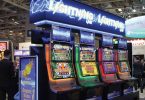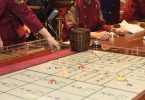The fluctuating fortunes of Macau gaming shares in recent weeks has sent analysts into meltdown, but MGM China CEO Grant Bowie says Macau’s casinos have performed significantly better than free-falling share prices have suggested over the past 18 months.
Speaking exclusively with WGM in a wide-ranging interview for our upcoming Jan/Feb 2016 issue, Bowie has described the ongoing downturn – which saw gross gaming revenue (GGR) fall for a 17th straight month in October – as the shock Macau had to have if it is to remain viable long into the future.

That shock has been particularly painful for shareholders, who have seen prices fall by as much as 75 percent from their record highs of two years ago.
However, buoyed by the government’s diversification push and a greater focus on mass market gaming, Bowie expects share prices to react positively once Macau’s GGR stabilizes.
“Are all of our businesses worth more than where the share price is sitting? Absolutely,” Bowie explained.
“All of the companies are fundamentally strong.

“Our share prices were probably overly ramped (at their peak) in regards to their speculative high levels of liquidity but just as the pendulum swings one side to the other, we’ve suffered from the other side of things too.
“Clearly we’d love to see shares back to those their previous high prices but the difficulty is that the value of the business is not the share price. The share price is a global perception of confidence and the challenge for us is that confidence has been battered because there seems to be no clear structure as to whether we are part of (Macau’s) future or part of the past. My perception is that we are part of the future without a shadow of a doubt.
“The share price will come back when the market regains confidence – when they have a sense of what the future holds.”
Bowie also pointed to the sheer volume of gaming analysts studying and commenting on Macau as often complicating the situation with some perhaps trying too hard to stand out from the crowd.
“I think last count there were 32 different analysts focusing on six stocks which is an awful concentration of analysts into a relatively small market,” he said.
“The positive we should take from those numbers is that it shows we are interesting. We were the success story and we are still the success story but now we’re over-analyzed because everyone is trying to create their own perspective.
“Some are more accurate than others. The seasoned analysts are more judicious, the young guys can say whatever they like. So I think there is a time for all of us to help rebuild the confidence of the market and once that happens we will see the shares get back up there because the operators in Macau are all fundamentally strong.”







